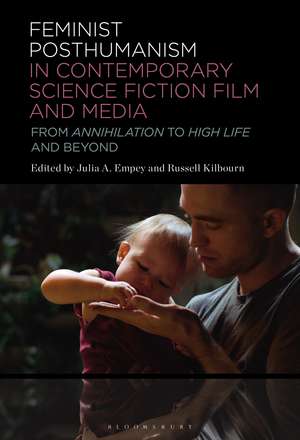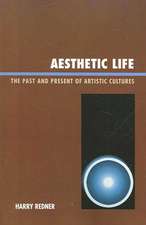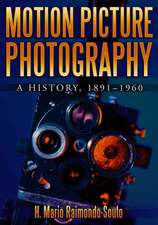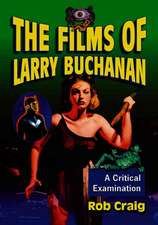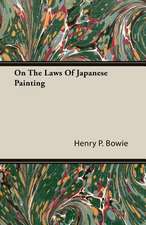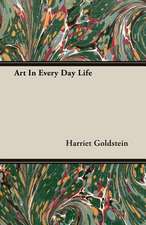Feminist Posthumanism in Contemporary Science Fiction Film and Media: From Annihilation to High Life and Beyond
Editat de Julia A. Empey, Russell J.A. Kilbournen Limba Engleză Hardback – 20 sep 2023
Preț: 541.44 lei
Preț vechi: 774.67 lei
-30% Nou
Puncte Express: 812
Preț estimativ în valută:
103.62€ • 107.78$ • 85.54£
103.62€ • 107.78$ • 85.54£
Carte tipărită la comandă
Livrare economică 14-28 aprilie
Preluare comenzi: 021 569.72.76
Specificații
ISBN-13: 9781501398407
ISBN-10: 1501398407
Pagini: 328
Ilustrații: 48 bw illus
Dimensiuni: 152 x 229 x 20 mm
Greutate: 0.6 kg
Editura: Bloomsbury Publishing
Colecția Bloomsbury Academic
Locul publicării:New York, United States
ISBN-10: 1501398407
Pagini: 328
Ilustrații: 48 bw illus
Dimensiuni: 152 x 229 x 20 mm
Greutate: 0.6 kg
Editura: Bloomsbury Publishing
Colecția Bloomsbury Academic
Locul publicării:New York, United States
Caracteristici
Covers three major subject areas: posthumanism, a burgeoning field with rich potential, particularly feminist theory, feminist cultural critiques, and visually based science fiction media with an emphasis on formal analysis
Notă biografică
Julia A. Empey is a SSHRC Postdoctoral Fellow in the Faculty of English at the University of Cambridge, UK, and currently the book reviews editor at Interconnections: The Journal of Posthumanism. Her research and publication interests focus on contemporary literature and film, feminist and posthumanist theory, and science fiction literature, film, and media. Her other interests include eco-criticism, cosmopolitan studies, and political theory.Russell J. A. Kilbourn is Professor and Chair of English and Film Studies at Wilfrid Laurier University, Canada. He publishes on memory, film, comparative studies, critical posthumanism, and postsecular cinema. His books include The Cinema of Paolo Sorrentino: Commitment to Style (2020), W.G. Sebald's Postsecular Redemption: Catastrophe with Spectator (2018), The Memory Effect: The Remediation of Memory in Literature and Film (co-edited with Eleanor Ty; 2013), and Cinema, Memory, Modernity: The Representation of Memory from the Art Film to Transnational Cinema (2010). Dr. Kilbourn is one of the founders of the Posthumanism Research Network (based at Brock University and Wilfrid Laurier), an associate editor at Interconnections: The Journal of Posthumanism, and a member of the editorial board of the Journal of Italian Cinema and Media Studies. His current project is on posthuman memory.
Cuprins
List of ContributorsAcknowledgementsPreface Introduction-Feminist Refractions of the PosthumanJulia A. Empey(University of Cambridge, UK) and Russell J. A. Kilbourn (Wilfrid Laurier University, Canada) PART ONE: Posthuman Bodies and Identities1. Indigenous Futurist and Women-Centred Dystopian FilmMissy Molloy (Victoria University of Wellington, Aotearoa New Zealand)2. Gender, Sex, and Feminist AI: 13 Theses on HerSarah Stulz (Independent Scholar, Switzerland)3. Her: A Posthuman Love StoryZorianna Zurba (Toronto Metropolitan University, Canada)4. Posthuman Mothers and Reproductive Biovalue in Blade Runner: 2049 and Jurassic World: Fallen KingdomJerika Sanderson (University of Waterloo, Canada)5. Desirable and Undesirable Cyborg Bodies in the Mass Effect Video Game SeriesSarah Stang (Brock University, Canada) PART TWO: Posthuman Environments and Entanglements6. Material Entanglements and Posthuman Female Subjectivity in AnnihilationEvdokia Stefanopoulou (Aristotle University of Thessaloniki, Greece)7. Jonathan Glazer's Under the Skin: Female Embodiment and EcologyMeraj Dhir (Harvard University, USA)8. Living in Colour: Feminist and Posthumanist Ontology in Upstream ColorEmily Sanders(Queen's University, Canada)9. Ascendance to Trans-Corporeality or Assimilation to Whiteness: The Posthuman Imaginaries of Annihilation and MidsommarOlivia Stowell (University of Michigan, USA) PART THREE: Posthumanist Endings and Futures10. Digital Ecologies: Posthuman Convergences in Abzû and Horizon: Zero DawnSarah Best (Wilfrid Laurier University, Canada)11. From Rogue Planets to Black Holes: Revaluing Death in Melancholia and High LifeJulia A. Empey(University of Cambridge, UK)12. 'Originary Twoness': Flashbacks and the Materiality of Memory in Annihilation, High Life, and ArrivalRussell J. A. Kilbourn (Wilfrid Laurier University, Canada)13. Coming to Terms with Our Own Ends: Failed Reproduction and the End of the Hu/man in Claire Denis' High Life and Pella Kågerman and Hugo Lija's AniaraElif Sendur (Rutgers University, USA) and Allison Mackey (Universidad de la República, Uruguay)ReferencesIndex
Recenzii
Fans of Rosi Braidotti's work are in for a particular treat with Feminist Posthumanism in Contemporary Science Fiction Film and Media. Taking in games, films and other media objects, the book offers a compelling range of interventions, often circling back to Braidotti, and which at their most exciting are well attuned to the need for intersectional feminism not only to make sense of our contemporary mediascape, but also to forge a new conceptual framework through which to prepare for the changes that our planet requires (and inevitably faces). Critiquing key recent media texts from the west, including Annihilation, Her, High Life, Bioshock and Mass Effect, this is a must-read for anyone invested in our present-day (post)humanities.
Our current mythologies are established in films and media. This book allows for new trajectories of radical imagination to be traced, in the often still anthropocentric field of media production. Posthuman feminist awareness, multispecies justice and human and non-human dignity are thus envisioned and manifested. This book is a precious gift to our society, in need of healing and transformation.
Our current mythologies are established in films and media. This book allows for new trajectories of radical imagination to be traced, in the often still anthropocentric field of media production. Posthuman feminist awareness, multispecies justice and human and non-human dignity are thus envisioned and manifested. This book is a precious gift to our society, in need of healing and transformation.
